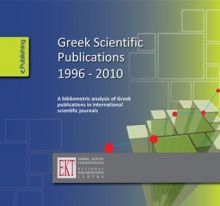
Greek Scientific Publications 1996-2010: EKT releases the English Version of the Study Online

The National Documentation Centre (EKT) has now released the English version of the second part of the study series “Greek Scientific Publications: Bibliometric analysis”. The study covers the periods 1993-2008 and 1996-2010 with an aim to analyze Greek Scientific activity in the international landscape.
The study “Greek Scientific Publications 1996-2010: Bibliometric analysis of Greek scientific Journals” relies on a range of data related with Greek Publications –such as the amount of publications, citations received, their distribution across scientific fields and institutions- to produce indicators which characterize the country’s research activity, describe its progress and strengths and allow for further correlations with activity at EU and international level.
The study, being a result of systematic and collaborative work, has created a consistent ground for monitoring and presenting data for the research environment in Greece and has enabled correlations with levels of research activity in EU and OECD countries. With this initiative, EKT aims to provide reliable evidence on the Greek research area and contribute to a broader understanding of the potentials and challenges of Research and Development (R& D) in Greece.
The National Documentation Centre follows a distinct methodological approach, applies advanced validation techniques and develops the software required for the procession and analysis of data. Data for both editions was drawn from the databases of the Web of Science (Thomson Reuters). It is the first time that a study series of this scale maps Greek research activity across all disciplines and scientific fields, institutions and public bodies, individual researchers, research teams etc.
In an attempt to point to recent trends and progressions, there is a special focus on data which emerged lately. Aiming at ensuring consistency of calculations, the study adopts to a great degree the basic methodological framework followed in the previous study (e.g. databases, range of indicators, scientific fields).The study produced indicators regarding scientific publications produced by 81 institutions in the country such as universities, cultural institutions, research centers, public and private health institutions etc. The main findings can be summarized:
Greek Scientific Publications: Indicators
Until 2008, the overall output of Greek scientific publications experienced a continuous increase with a rate higher than the rest EU countries and OECD countries. In 2009, there was a decline in the number of publications produced. In 2010, there was a decrease in the EU and OECD publications output. For Greece, the decrease was even higher.
Greek publications displayed a steady rise –throughout the period 1996-2010- in terms of the number of citations received. The rise levels were higher when compared to relevant data emerging from EU and OECD countries.
In the years 2006-2010, Greek scientific publications received 222.132 citations, a number four times higher than in the period 1996-2010. During these years, all indicators displayed a growth rate. In 2006- 2010, 65,5 % of Greek Scientific Publications received citations –a percentage which approaches the average levels of EU and OECD countries-.
Which bodies and institutions produced the greatest amounts of scientific publications?
'Universities', 'Research Centers supervised by GRST' and public health bodies are the institutions categories that produced the greatest number of publications. The institution categories of ‘TEIs’, 'Other Research Bodies', 'Private Health Bodies' follow with significant numbers of publications. During the five year-period 2006-2010, 'Universities' produced a 82,5% of the overall number of publications. 'Research centers supervised by GRST' followed with 13,7%, 'Public health bodies' with 11,5%, 'TEIs' with 4.2% of the publications. A citation impact higher than the world average was achieved by publications coming from 'Research centers supervised by GGET 'and the 'Private health bodies'. In terms of the number of citations, Greece presented higher rates of increase in comparison with EU and OECD countries throughout the period 1996-2010. During the period 2006-2010, Greek scientific publications received 222.132 citations, a number which is four times greater than the number of citations received in the period 1996-2010.
Prevailing scientific fields
Greek scientific publications were distributed along six scientific fields (Natural Sciences, Engineering and Technology, Medical and Health Sciences, Agricultural Sciences, Social Sciences and Humanities) and their subfields according to OECD standards. In 2010, the majority of publications fall under the field of Natural Sciences. Publications were also distributed in the following fields: Medical and Health Sciences(39,4%), Engineering and Technology (23,6%), Social sciences(6,3%), Agriculture(3,3%) and Humanities (1,5%). The categories with the highest relative citation impact were Agricultural Sciences (0,97) and Natural Sciences (0,92).
Scientific collaborations at the international level
A 42,3% of Greek scientific publications was produced as a result of international collaboration and a 35,3% was carried out as a result of collaborations at the national level. During the fifteen years period 1996-2010 there was an observed rise in publications carried out as a result of international collaboration. Although throughout the period, there was a significant growth rate in the number of national collaborations, after 2008, the number of collaborations at the national level remains almost stable. International collaborations primarily involved USA, United Kingdom, Germany, France and Italy. Universities had the greatest number of publications without collaborations. Data about GRST research centers describes a high percentage of publications with international collaboration.
The study’s English version is now available at http://metrics.ekt.gr/en/report02/index. Visitors can read the study’s findings in detail and navigate through interactive charts and visual applications which best illustrate results.
|
|
|













